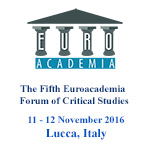Euroacademia Conferences
 Europe Inside-Out: Europe and Europeanness Exposed to Plural Observers (9th Edition) April 24 - 25, 2020
Europe Inside-Out: Europe and Europeanness Exposed to Plural Observers (9th Edition) April 24 - 25, 2020 Identities and Identifications: Politicized Uses of Collective Identities (9th Edition) June 12 - 13, 2020
Identities and Identifications: Politicized Uses of Collective Identities (9th Edition) June 12 - 13, 2020 8th Forum of Critical Studies: Asking Big Questions Again January 24 - 25, 2020
8th Forum of Critical Studies: Asking Big Questions Again January 24 - 25, 2020 Re-Inventing Eastern Europe (7th Edition) December 13 - 14, 2019
Re-Inventing Eastern Europe (7th Edition) December 13 - 14, 2019 The European Union and the Politicization of Europe (8th Edition) October 25 - 26, 2019
The European Union and the Politicization of Europe (8th Edition) October 25 - 26, 2019 Identities and Identifications: Politicized Uses of Collective Identities (8th Edition) June 28 - 29, 2019
Identities and Identifications: Politicized Uses of Collective Identities (8th Edition) June 28 - 29, 2019 The European Union and the Politicization of Europe (7th Edition) January 25 - 26, 2019
The European Union and the Politicization of Europe (7th Edition) January 25 - 26, 2019 7th Forum of Critical Studies: Asking Big Questions Again November 23 - 24, 2018
7th Forum of Critical Studies: Asking Big Questions Again November 23 - 24, 2018 Europe Inside-Out: Europe and Europeanness Exposed to Plural Observers (8th Edition) September 28 - 30, 2018
Europe Inside-Out: Europe and Europeanness Exposed to Plural Observers (8th Edition) September 28 - 30, 2018 Identities and Identifications: Politicized Uses of Collective Identities (7th Edition) June 14 - 15, 2018
Identities and Identifications: Politicized Uses of Collective Identities (7th Edition) June 14 - 15, 2018
Spenser’s Lacanian Assault on the Classical Hero
-
-

-
Presentation speakers
- Vincent Mennella, Lone Star College, USA
- Download presentation
Abstract:
In a letter to Sir Walter Raleigh, Spenser states that the thesis of The Faerie Queene was to “fashion a gentleman or noble person in vertuous and gentle discipline (A Letter of the Authors 402).” As Stephen Greenblatt observes, the fashioning of the self was not unique to the Renaissance, but the practice had undergone a significant reduction in its autonomy (Renaissance Self-Fashioning 1). The firmly entrenched institutions of the church, the family, and the crown now played a more significant role in self-fashioning than they were able to do so in the past. However, Greenblatt invokes the Newtonian principle: for each and every action, there is an equal and opposite reaction. The assault on the autonomy of self-fashioning during the period of the Renaissance is the observable effect of the newfound importance of autonomous self-fashioning (2). The focus of my research is on the role of the Renaissance hero in self-fashioning. As Greenblatt notes, “self-fashioning is achieved in relation to something perceived as alien, strange, or hostile (9).” The classical hero represents autonomous self-fashioning entirely apart from the influences of church, crown, and family in favor of the hero’s divine origin. For that reason, I argue that it is not those social forces but the classical hero who is continuously under assault in the work of Spenser. As Greenblatt claims, “When one authority or alien is destroyed, another takes its place (9).” In the vanquishing of the classical hero, there is the birth of the Renaissance hero. In Spenser’s epic, the vanquishing of the classical hero and the birth of the Renaissance hero is best demonstrated by Redcrosse Knight’s Lacanian mirror stage. The events in Book I present Redcrosse Knight with gestalt images of his virtue, faith (as well as its opposite), that are more constituent than constituted. In response to those appearances, Redcrosse Knight fashions a Lacanian imago that shows the world the gentle deeds by which his gentle mind is known.
Works Cited: Greenblatt, Stephen. Renaissance Self-Fashioning. Chicago: U of Chicago P, 1980. Print. Spenser, Edmund. A Letter of the Authors. Poetry. Ed. Anne Lake Prescott and Andrew D. Hadfield. 4th ed. New York: Norton. 2014. Print. -
Related Presentations

The Pavilions in the Venice Art Biennale: National Representations in the XXI Century
- Ughetta Molin Fop

Creative Industries in Norway: A Question of Cultural Heritage and Identity
- Ekaterina Bagreeva

Institutionalised Identity
- Karolina Golinowska













